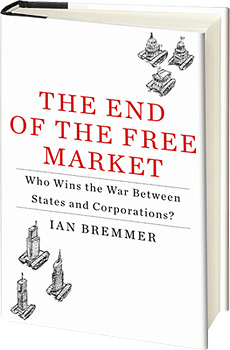 Ian comes back (on "The Call") with one more go in the conversation:
Ian comes back (on "The Call") with one more go in the conversation:
Today, a few final words from me on Tom Barnett’s thoughtful response to my book. Tom has argued that the state capitalist phenomenon is not as “unprecedented” as I think it is. He notes that “It’s not like OPEC’s national oil companies or China’s state-owned/-dominated enterprises came out of nowhere—they’ve been there all along.” He’s right about that, of course. OPEC was generating international headlines in the early 1970s. Sovereign wealth funds began appearing in the 1950s. China has had state-owned companies for decades.
In my opinion, the difference is not in the institutions but in their importance for international politics and the global economy. Until the end of the Cold War two decades ago, the isolation of the communist world imposed sharp limits on the global economy’s production capacity, but economic trends within it had little negative impact west of the iron curtain. Today, we’re wired together as never before.
The global economy will depend heavily on China for future growth for years to come. China’s growth has been dependent on exports to its largest trading partners: the European Union, the United States, and Japan. Though China has rebounded strongly from the global slowdown, thanks mainly to a massive state-directed spending spree, the Western financial crisis threw millions of Chinese out of work for some time. Greece’s vulnerability has threatened the cohesion of the entire eurozone.
And we now live in a world in which state-owned companies (which answer to political officials rather than shareholders) own more than three-quarters of the world’s crude oil reserves. With strong economic growth among emerging markets, global demand for oil is on a sharp upward trajectory. That means that state capitalist oil and gas exporters have much more direct impact on our standards of living than at any time in the past. And multinational companies are competing with Chinese state-owned giants armed with political and material support from Beijing in parts of the world where Chinese companies have only recently begun to compete.
State capitalism isn’t new, but it has never been so directly important for how the rest of us live. Throw in historic levels of market turbulence and long-term debt issues in America, Europe and Japan, and I think that we now find ourselves in an extraordinary transitional moment in the history of the global economy.
 Reply: Here's where Ian's argument serves its most useful purpose. The real threat from state capitalism isthat political self-preservation stands in the way of the technological and market innovation required to meet the resource requirements of this emerging global middle class. A Chinese economy that underperforms in its shift from extensive to intensive growth is bad news for everybody on the planet, but especially for the average Chinese. In the end, that's what'll drive the political system to open up: the fear of underperformance. So, in the end, it's not about the perceived "superiority" of state capitalism, which neither Ian nor I believe in (or peddle). Rather, it's about how long the Chinese "Communist" Party can maintain the illusion that the best route forward for the society is an economy that can be more pervasively commanded by the government (prioritizing stability) versus one that's truly liberated and fueled by the innovation of the Chinese people (prioritizing higher growth but accepting more churn). For now, the balance sits on the side of stability, given all the change churning its way through China right now. That won't end soon--but soon enough (e.g., the 6th generation of leadership that comes online in 2022 is the one to watch).
Reply: Here's where Ian's argument serves its most useful purpose. The real threat from state capitalism isthat political self-preservation stands in the way of the technological and market innovation required to meet the resource requirements of this emerging global middle class. A Chinese economy that underperforms in its shift from extensive to intensive growth is bad news for everybody on the planet, but especially for the average Chinese. In the end, that's what'll drive the political system to open up: the fear of underperformance. So, in the end, it's not about the perceived "superiority" of state capitalism, which neither Ian nor I believe in (or peddle). Rather, it's about how long the Chinese "Communist" Party can maintain the illusion that the best route forward for the society is an economy that can be more pervasively commanded by the government (prioritizing stability) versus one that's truly liberated and fueled by the innovation of the Chinese people (prioritizing higher growth but accepting more churn). For now, the balance sits on the side of stability, given all the change churning its way through China right now. That won't end soon--but soon enough (e.g., the 6th generation of leadership that comes online in 2022 is the one to watch).
I'm betting the greed of the Chinese people for a better life and more wealth will overwhelm the greed of the CCP to maintain a single-party state. So no idealism on my part: I simply like the numbers.
Again, Ian's book, on sale today, is called "The End of Free Markets."